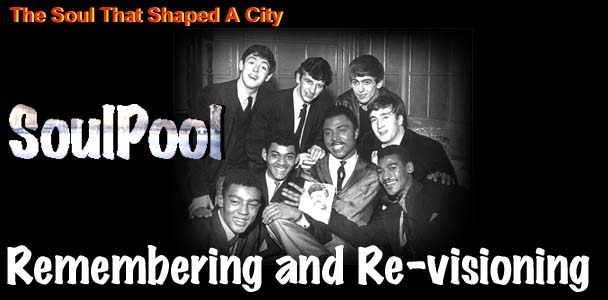
Featured in the banner above are: (front from left) Joe Ankrah, Sugar Dean, Little Richard, Derry Wilkie. On the back row are four unknown local musicians. (copyright Bill Harry. Printed with permission)
"REMEMBERING AND RE-VISIONING" Part 1
One of the fundamental questions that you come across whilst researching anything about Black music on Merseyside, besides the expropriation of the Black population's vast musical input from Liverpool's cultural history, is the failure to analyse the Musicians Union policy and its impact on Afro-American music of that time. There is real evidence that a form of "musical apartheid "developed that still exists to-day.
What happened in the
post-war years in terms of the transmission of Black music into the city
should be viewed as a major cultural gain. The influence of Black Afro-American
GIs on the city as a whole has yet to be truly analysed. 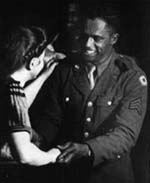 (Hopefully
the re-union of them taking place in Liverpool in October will allow for
expansion). Also the fact that young white Liverpool seamen were at the
same time championing little known Black musicians and defying the racial
orthodoxy's of that period should not be viewed with scorn as some local
supposed experts tend to do. Converging into this refusal to accept forms
of musical apartheid, would be the varieties brought into Liverpool by
the decision of the
(Hopefully
the re-union of them taking place in Liverpool in October will allow for
expansion). Also the fact that young white Liverpool seamen were at the
same time championing little known Black musicians and defying the racial
orthodoxy's of that period should not be viewed with scorn as some local
supposed experts tend to do. Converging into this refusal to accept forms
of musical apartheid, would be the varieties brought into Liverpool by
the decision of the 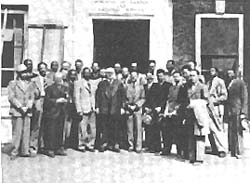 Colonial
Office to place over three hundred semi-skilled and skilled West Indian
volunteers into the city to help with the war effort. Proof of their aesthetic
can be identified a couple of years later, in 1948, when the Black community
found itself under sustained racist attack.
Colonial
Office to place over three hundred semi-skilled and skilled West Indian
volunteers into the city to help with the war effort. Proof of their aesthetic
can be identified a couple of years later, in 1948, when the Black community
found itself under sustained racist attack.
In the court cases
that followed, due to the fact that those arrested were predominantly
Black, "lawlessness within the community was cited as the reason for the
"unrest". The occupations given out by some of the defendants were music
based, a couple of bandleaders etc. One of the clubs that came under siege
was George Wilkie's in Upper Parliament Street. All evidence suggests
that "Calypso-bands" were in residence in that club. Liverpool as a city
therefore would have been, in the late 1940s, the embodiment of musical
forms linking Black R'n'B styles, Caribbean "Kaiso", and African vernacular
styles. It is our intention to pay a tribute to Lord Woodbine, who died
recently. The tribute will be about his role in introducing Liverpool
to calypso/steel band forms of music, instead of the stereotypical nonsense
as described in local obituaries.
The implications of refusing to accept the major role of Black music within Liverpool's musical culture, and thus airbrushing it out of existence, means that people are sailing very close to "a racist wind". In the year 2000, the fact that you cannot find any body of work around the subject is final confirmation. Instead we are left with a view of popular music and the linkage of the Beatles to Presley, Holly etc, whereby you would have to agree with the Black musicologist, Portia Maultsby who concluded that with the success of white rock and rollers with styles of obvious Black influence, plus the proliferation of the "cover syndrome", i.e., in order to counteract the immense crossover influence of R'n'B in the early fifties, record companies deliberately copied/covered versions with white artists, "It was the most wide-spread, systematic rape and uncompensated cultural exploitation the music business has ever seen".
As part of our remembering
and re-visioning of Black music, four artists in particular plus the all
girl group the Shirelles, will be the points of reference
in terms of their roles of influence not just on local black musicians
of the time but also in a wider socio/cultural/political context.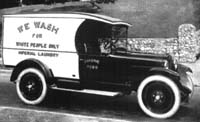 For that is how all Black music must be viewed. Just as Afro- American
music of the fifties and sixties was a reflection of the demands for civil
rights, so the transition of calypso into "blue-beat/ska was a reflection
of colonial and political struggles taking place in the Caribbean.
For that is how all Black music must be viewed. Just as Afro- American
music of the fifties and sixties was a reflection of the demands for civil
rights, so the transition of calypso into "blue-beat/ska was a reflection
of colonial and political struggles taking place in the Caribbean.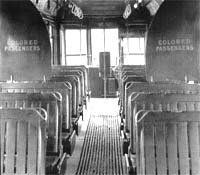 The failure to place the lineages and codifications in those particular
contexts, denies the pressing need for Black cultural expressions and
their histories to be taken seriously. There is, as well, the startling
contrast in the cross- fertilisation process whereby with the transmission
of music into Liverpool, at a time when the whole racist mentality prevalent
in America was being challenged in action and song, here in Liverpool
I could gain access to clubs to listen to Black music but my mates could
not due to the insidious "Colour-Bar". The relationship between those
experiences, cross-Atlantic wise, and the "denial" form of mentality still
prevalent in the city needs to be part of a more wide ranging narrative.
The failure to place the lineages and codifications in those particular
contexts, denies the pressing need for Black cultural expressions and
their histories to be taken seriously. There is, as well, the startling
contrast in the cross- fertilisation process whereby with the transmission
of music into Liverpool, at a time when the whole racist mentality prevalent
in America was being challenged in action and song, here in Liverpool
I could gain access to clubs to listen to Black music but my mates could
not due to the insidious "Colour-Bar". The relationship between those
experiences, cross-Atlantic wise, and the "denial" form of mentality still
prevalent in the city needs to be part of a more wide ranging narrative.
BROTHER RAY SANG IN 1960- "TELL THE TRUTH" We will do just that.
A favourite with a lot of young Liverpool seamen, some of whom had his rendition of "Unchained Melody" as their wedding song. (His is the definitive version, years before the Righteous Brothers got hold of it) He was born blind in 1915 in Little Rock, Arkansas. He joined Duke Ellington's band and was with them from 1943 to1951. A baritone to begin with, but as years went by, he began to give "standards" a much more gospel-blues feel. He joined the civil-rights protests in the early sixties and played a key role in confronting the racism in Birmingham Alabama, with his refrain of "Tho' I'm blind I can see the injustice here". Of course, this put him up against the racist brutality of Eugene "Bull" Connor and his police force, and their methods of crowd control, flesh -stripping fire-hoses and growling dogs. Every time he was arrested and then released, "Hib" would be back the next day proud and defiant - a true working class hero. As was,
ROY HAMILTON
Another seamen's favourite. Born in Georgia in 1929. He was a singer with the Searchlight Gospel Singers and later went solo. He also recorded "Unchained Melody" in 1955. (Both Hibbler's and Hamilton's versions, although far superior, were marginalised by a cover version from Les Baxter). In one of Presley's first interviews to do with influences etc, Roy Hamilton was cited as being primary. Hamilton later recorded a stunning version of "You'll Never Walk Alone" that was then used as an anthem by Civil Rights activists in the South. (This version would definitely re-energise the crowd at Anfield.) Roy Hamilton also played a major activist role in the Civil Rights movement until tragically cut down by a stroke in 1969. He is not forgotten though. In a beautiful piece of irony, he did a cover version of the Beatles "And I Love Her" but in a medium tempo that is now a "Northern Soul" classic. In fact, his co-option on to the circuit has meant he has become in posterity, a "collectors item". A fitting tribute.
THE
SISTERS................. THE SHIRELLES 
The definitive "All Girl Band". All hailed from Passaic, New Jersey and were originally known as The Poquellos. Shirley Alston and her "Sisters" paved the way for what came later. They have tended to be forgotten/or written off on the basis of being too lightweight. This in itself fails to explain the fact why the Beatles covered two of their songs, "Baby It's You", and "Boys", and why "Dedicated To the One I Love" that the Shirelles had released in 1958, was then covered by the Mamas and the Papas nearly ten years later. The Shirelles and to a lesser degree The Cookies who were backing Ray Charles in the fifties, challenged the "macho "images that were around popular music at that time. Some critics have suggested that Shirley Alston's voice on "Will You Still Love Me Tomorrow" is too flat to carry the song, but there is a glorious irony as tale of boy meets girl, girl deciding whether to sleep with boy, if she does "would he still be with her afterwards", unfolds. Of course, the sexual mores of the times would tell her "no" and that is how she sings it. An exemplary piece of early feminist critique.
SAM COOKE
Born in Mississippi
in 1931. Tragically, shot in mysterious circumstances in 1964. When you
listen to Sam Cooke, like Marvin Gaye after him, you do know that "Angels
can sing". Like so many before and after, he started out as a gospel singer.
In 1950 he was the lead singer with the 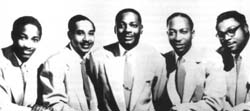 Soul
Stirrers who he stayed with until 1956 when he went solo. Clyde McPhatter
of the Drifters, Ray Charles, and Sam Cooke were major protagonists in
the huge surge in bi-racial crossover music in the 1950s. Sam Cooke has
tended to attract criticism for recording material way below his talent.
On the other hand whether it be "Chain Gang", "Having a Party", or "Bring
it on Home to Me", these were records steeped in the Afro-American cultural
practices. Sam Cooke was also outspoken over Civil Rights, and in fact,
the circumstances around his death reflect the surveillance he was under
at the time.
Soul
Stirrers who he stayed with until 1956 when he went solo. Clyde McPhatter
of the Drifters, Ray Charles, and Sam Cooke were major protagonists in
the huge surge in bi-racial crossover music in the 1950s. Sam Cooke has
tended to attract criticism for recording material way below his talent.
On the other hand whether it be "Chain Gang", "Having a Party", or "Bring
it on Home to Me", these were records steeped in the Afro-American cultural
practices. Sam Cooke was also outspoken over Civil Rights, and in fact,
the circumstances around his death reflect the surveillance he was under
at the time.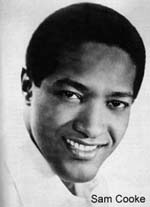 For
every cabaret appearance he made, there would be a reciprocal date in
Harlem or in the Deep South. John Lennon is quoted as telling Alan Klein,
the one-time Beatles financial advisor, that "If you can understand Sam
Cooke's music, you can understand mine". If it is a toss up between Sam
Cooke's "A Change is Gonna Come" or "I am the Walrus", "'nuff" said. And
anyway while Cooke's recording of "Wonderful World " in 1960 is normally
thrown up as evidence of sentimental dross", the words of the song - "Don't
know much about history", ditto "biology" is a subtle and powerful riposte
to the Klan and white supremacists in general.
For
every cabaret appearance he made, there would be a reciprocal date in
Harlem or in the Deep South. John Lennon is quoted as telling Alan Klein,
the one-time Beatles financial advisor, that "If you can understand Sam
Cooke's music, you can understand mine". If it is a toss up between Sam
Cooke's "A Change is Gonna Come" or "I am the Walrus", "'nuff" said. And
anyway while Cooke's recording of "Wonderful World " in 1960 is normally
thrown up as evidence of sentimental dross", the words of the song - "Don't
know much about history", ditto "biology" is a subtle and powerful riposte
to the Klan and white supremacists in general.
"BROTHER" RAY CHARLES
- "THE MAIN MAN"
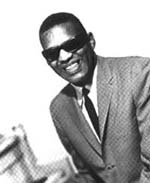 Born
in Albany, Georgia in 1930. By the age of seven, he was blinded by glaucoma.
There are very few people who you could say could match Charles's achievements
as artist, composer, arranger, and in general all round musician. In any
discussion around popular music, the shadow of Ray Charles would loom
large, except of course within the "Mersey Beat Industry" whereby Arthur
Askey tends to be viewed with a greater reverence. It was in the late
fifties that the Beatles were introduced to Ray Charles by Derry Wilkie,
when they were in Hamburg (Wilkie was in fact the first local musician
to play over there). When they returned to Liverpool, some of Charles's
work became part of their regular repertoire. His work only became released
in this country in 1960. The prodigious work on The Atlantic label from
1952 to 1959, never gained recognition in the UK. His music from this
period was banned by a lot of white radio stations, and he only charted
within the confines of the separate R'n'B category that was for "race
-music".
Born
in Albany, Georgia in 1930. By the age of seven, he was blinded by glaucoma.
There are very few people who you could say could match Charles's achievements
as artist, composer, arranger, and in general all round musician. In any
discussion around popular music, the shadow of Ray Charles would loom
large, except of course within the "Mersey Beat Industry" whereby Arthur
Askey tends to be viewed with a greater reverence. It was in the late
fifties that the Beatles were introduced to Ray Charles by Derry Wilkie,
when they were in Hamburg (Wilkie was in fact the first local musician
to play over there). When they returned to Liverpool, some of Charles's
work became part of their regular repertoire. His work only became released
in this country in 1960. The prodigious work on The Atlantic label from
1952 to 1959, never gained recognition in the UK. His music from this
period was banned by a lot of white radio stations, and he only charted
within the confines of the separate R'n'B category that was for "race
-music".
You can see why the word genius was attached to him. He created a sounding board for rock and roll from 1952 onwards with the release of "I've Got a Woman", and later on in 1959 his music is acknowledged as the defining moment in the production of what was later to become "soul music", when he wrote and recorded one of the most covered records in musical history - "What'd I Say." The same guitar licks can be found on numerous Beatles records, in particular, Day-Tripper and I Feel Fine.
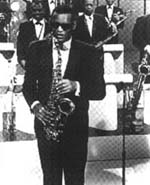 Jerry
Wexler and the founder of Atlantic, Ahmet Ertegun, both agreed that the
use of the word "genius" when discussing Ray Charles was common-place
because simply that is what he was. So when they signed him in 1952, and
in 1954 he played to them "I've Got a Woman", they both knew that music
would never ever be the same. What Ray Charles did in the early fifties
was to take the "sanctifyin' and testifyin'" of the black gospel tradition
and blend it with the great Afro-American musical forms of jazz, blues,
a honking horn section with bits of Latino thrown in to produce a glorious
musical celebration that removed any distinction between the Sunday morning
worshipper and the Saturday evening reveller (normally one and the same.)
All this as well with the Cookies cranking it up in the background. Music
of total agony and ecstasy. When he recorded "Georgia on My Mind" in 1960,
his version was of political and racial significance, as it reflected
the black experience and was a commentary on the black struggles of the
time. It was "Hit the Road Jack" rather than "Blowing in the Wind" that
was one the staples of the Civil Rights marchers in the southern states.
As Bernice Johnson Reagon, one of the Freedom Singers, the Civil Rights
gospel choir, said "People are walking out of churches..........going
to jail and that sound is Ray Charles". While speaking with Sugar Dean,
I asked him to play "The Best Of Ray Charles-The Atlantic Years." Needless
to say, not much was spoken, yet memory was re-awakened. Ray Charles not
only "souled out" much of
Jerry
Wexler and the founder of Atlantic, Ahmet Ertegun, both agreed that the
use of the word "genius" when discussing Ray Charles was common-place
because simply that is what he was. So when they signed him in 1952, and
in 1954 he played to them "I've Got a Woman", they both knew that music
would never ever be the same. What Ray Charles did in the early fifties
was to take the "sanctifyin' and testifyin'" of the black gospel tradition
and blend it with the great Afro-American musical forms of jazz, blues,
a honking horn section with bits of Latino thrown in to produce a glorious
musical celebration that removed any distinction between the Sunday morning
worshipper and the Saturday evening reveller (normally one and the same.)
All this as well with the Cookies cranking it up in the background. Music
of total agony and ecstasy. When he recorded "Georgia on My Mind" in 1960,
his version was of political and racial significance, as it reflected
the black experience and was a commentary on the black struggles of the
time. It was "Hit the Road Jack" rather than "Blowing in the Wind" that
was one the staples of the Civil Rights marchers in the southern states.
As Bernice Johnson Reagon, one of the Freedom Singers, the Civil Rights
gospel choir, said "People are walking out of churches..........going
to jail and that sound is Ray Charles". While speaking with Sugar Dean,
I asked him to play "The Best Of Ray Charles-The Atlantic Years." Needless
to say, not much was spoken, yet memory was re-awakened. Ray Charles not
only "souled out" much of  white
America, Brother Ray also "souled out" the City of Liverpool.
white
America, Brother Ray also "souled out" the City of Liverpool.
continue to Part 2 "Local Soul Brothers and Sisters"
 |
 |
 |

